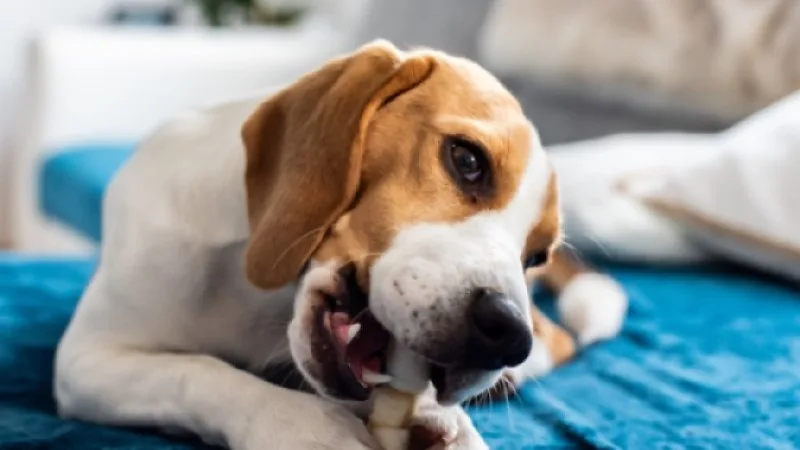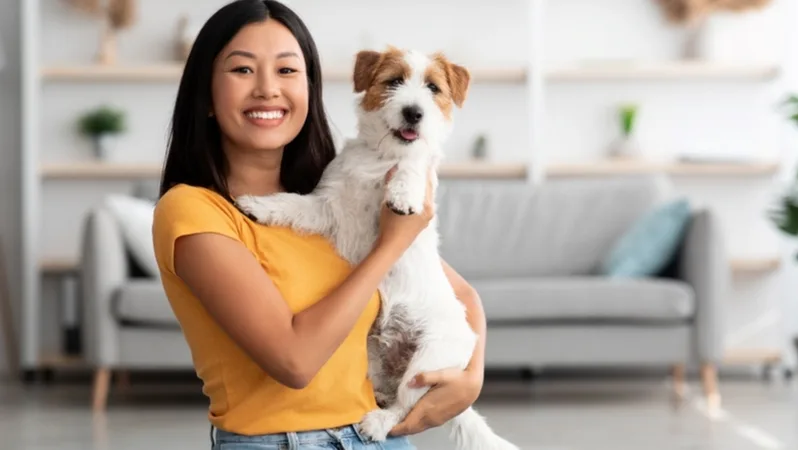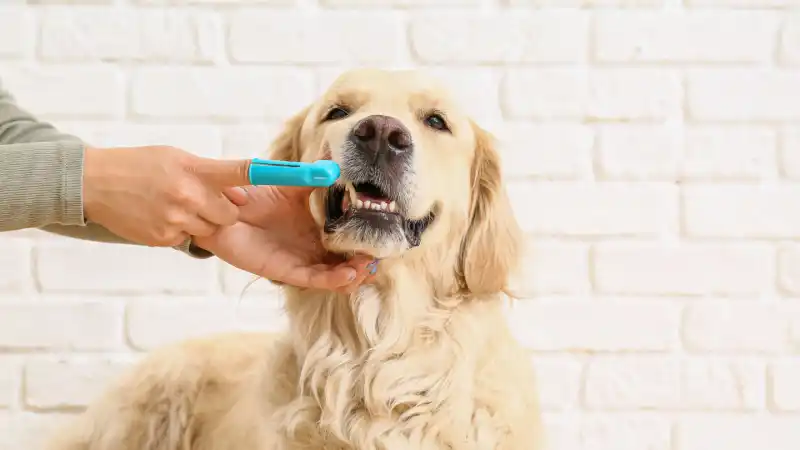What to Do if Your Dog Eats a Chicken Bone
Dogs love to chew on bones as a treat, but chicken bones are very dangerous for them. Learn more about what to do if your dog eats a chicken bone.

With dogs, accidents can easily happen, and it only takes a moment for a dangerous situation to occur. Many dogs will steal food from the counter or your plate when you're not looking… and many human foods can be hazardous to your pup's health.
Even though you may give your dog raw bones to chew on as a treat, cooked bones (like chicken bones) are dangerous and should never be offered to a pet. So, if your dog has recently eaten a chicken bone, stay calm and follow these steps.
7 Things to Do if Your Dog Eats a Chicken Bone
Follow these 7 steps if your dog has eaten a chicken bone to help limit the potential health risks:
1. Don't Panic
While it’s natural to panic when you think your dog is in danger, it's important to remain calm. Raising your voice and making sudden movements can increase your dog's stress levels and worsen their condition.
If your dog hasn't completely swallowed the bone yet, calmly try to remove it from their grasp. A panicked removal motion can trigger a dog to be possessive of the bone, and they may try and swallow it quickly. Never try to forcibly take a chicken bone (or any object) away from your dog, especially those small enough to be choked on.
Another tip is to trade up with a higher-value item like steak that your dog will happily exchange the chicken bone for. This tip only works if the item is very high-value, so training to trade up will help avoid this and similar situations.
2. Call Your Veterinarian Immediately
If your dog is not actively choking, call your veterinarian and explain the situation. They will be able to walk you through your next steps and give you a better sense of whether your dog is in any immediate danger.
In some scenarios, your dog may swallow the chicken bone and be perfectly fine. Your vet can help you recognize if this is the case, or if you need to seek further medical attention.
3. Make Sure Your Dog Isn't Choking
The most immediate cause for concern would be if the chicken bone is lodged in your dog's airways. If your dog is choking, they may start retching or acting like they're trying to cough something up. They may also pace back and forth, roll around on the ground, or paw at their mouth.
Unfortunately, if their airway is completely blocked, they won't be able to make any noise at all, so you'll have to pay extra close attention to their body language. If your dog is choking, don't wait to call your vet. You need to take immediate action.
First, check inside your dog's mouth to see if you can remove whatever object is lodged in their throat. If you're not able to remove the object, your next option is to use the Heimlich maneuver, just like with a person. There are two different ways to perform this maneuver, depending on the size of your dog. There is an abdominal compression technique for medium to large-sized dogs and a chest thrust technique for small dogs. Both techniques are very simple.
4. What Happens If My Dog Eats a Chicken Bone?
Even the best-behaved dog will eat food off the counter, and some may not even choke on a chicken bone. So, ideally, you will only need to monitor their behavior.
If your dog has already eaten the bone and it's not lodged in their airways, you'll need to watch for signs of blockage or internal bleeding. If your dog displays any of the following symptoms, take them to your veterinarian immediately:
Vomiting
Diarrhea
Loss of appetite
Constipation
Bloody stool
Refusal to drink
Bloating
Abdominal pain
Whining
Lethargy
If your dog appears to be active and eating and drinking normally, then it's likely they’ll be okay. In this case, you can continue to monitor the situation without seeking immediate medical assistance.
You'll want to watch your dog's stool for several days (at least 72 hours) after they eat the bone for signs of bone fragments. In addition, you should still follow up with your vet in case there's any remaining bone left in your dog's intestines or esophagus. The bones can splinter and puncture these internal organs.
5. Never Induce Vomiting
Inducing vomiting increases the risk of the chicken bone getting stuck in the esophagus on the way back up or causing more lacerations to your dog's airways.
The safest thing to do is to head to the vet if you see the above symptoms.
6. Give Your Dog a Soft Piece of Bread
If your dog is willing to eat a soft piece of bread, it can keep the fragments from puncturing their stomach. In addition, it can protect the lining of your dog's digestive system and stimulate the digestive juices to help break down the bone faster.
According to vet experts at Urgent Pet Care Omaha, “It may be helpful to give your dog a soft piece of food, such as a piece of bread, which will provide a form of cushioning in their stomach. Soft food can serve as a way to protect the lining of your dog’s digestive system from being scratched.”
7. Keep Your Dog Hydrated
If your dog has completely swallowed the chicken bone, it's vital to ensure they digest it as quickly and effectively as possible. And if they're dehydrated, their digestion will slow down, and the bones won’t come out the other end.
Provide access to plenty of fresh water, and consider adding water or bone broth to your dog's regular meals to make digestion even easier.

Every Dog and Cat Deserves the Pet Insurance of Champions
Get prize-winning care for your pets.
Why Are Cooked Chicken Bones Bad for Dogs?
Cooked bones are softer than the raw bones you would buy from the pet store. Because they're softer, they can easily splinter when your pup chews on them.
When the bone splinters, it creates sharp edges that can damage your dog's mouth, airways, and gastrointestinal tract. Bone splinters are a choking hazard, and may tear the esophagus or intestinal tract.
Create a risk for pancreatitis as bone marrow has high fat
Get stuck on the roof of your dog’s mouth between their molars
Cause a blockage in your dog's small intestine or colon
Get stuck in your dog's stomach
Be contaminated with pathogens like Salmonella
Should You Be Worried If Your Dog Eats a Chicken Bone?
In many cases, if your dog stays active, continues to eat and drink, and doesn't exhibit any negative symptoms after eating a cooked chicken bone, they will be fine. The bone will pass through their digestive tract without causing any damage.
However, it's still important to be cautious and check with your veterinarian immediately after consumption. Your vet will be able to give you next steps that will help you keep your dog safe.
You should also always practice caution with bones around your dog. For example, keep all food out of your dog's reach and dispose of bones as soon as you've finished your meal. Also, warn guests not to feed your dog portions of their meal!
The best way to protect your dog is to prevent them from eating bones in the first place. So, always be aware of what they're scavenging when you're outside and keep an eye on them when they're around food.
Take some of the stress out of doggy dining mishaps with Accident & Illness Coverage for dogs from AKC Pet Insurance (underwritten by Independence American Insurance Company). Our dog pet insurance plans are designed to be there when you need them, allowing you to focus more on the health of your pet and less on costly veterinary bills.

Every Dog and Cat Deserves the Pet Insurance of Champions
Get prize-winning care for your pets.

Richard has shared his life with pets since childhood, and currently has a rescue cat and dog. He works with veterinarians and pet businesses to improve their content. To find out more, please visit his [website](https://richardrowlands.com/).
READ MORE ARTICLES

